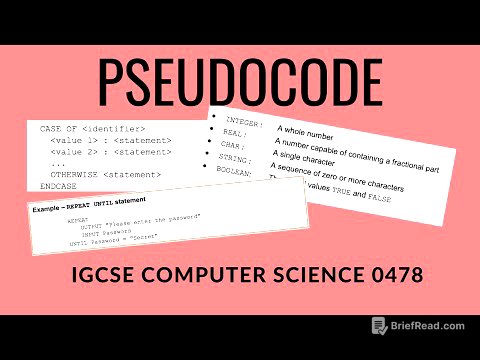TLDR;
This video discusses the benefits of index investing and identifies the top three index funds for building a long-term investment portfolio. It emphasizes the importance of focusing on personal skills and income generation over constantly monitoring the stock market. The video also compares index funds and ETFs, explaining key metrics like expense ratio and tracking error, and offers advice on choosing the right investment method based on individual comfort and investment goals.
- Index investing allows focus on personal development and income generation.
- Key indices include Nifty50, Nifty Next 50, and Nifty Midcap 150.
- Expense ratio and tracking error are important metrics for evaluating index funds and ETFs.
Introduction to Index Investing [0:00]
The video introduces the concept of building an investment portfolio using the top three index funds. The speaker, who manages a substantial portfolio primarily through index investing, emphasizes that the main advantage of this approach is freedom from the need to constantly monitor the stock market. This allows investors to focus on personal development, health, family, and skills, which are more important for long-term wealth creation. Simplifying investments with a few index funds helps avoid distractions from trading advice and promotes consistent, long-term growth.
Available Indices and Their Benefits [1:16]
The speaker outlines several key indices available for investment, including Nifty50 (top 50 companies in India), Nifty Next 50 (companies ranked 51-100), and Nifty Midcap 150. Investing in these indices frees investors from tracking individual company performance and the ever-changing recommendations of actively managed mutual funds. Consistently switching funds based on annual performance lists can harm compounding returns, whereas index investing allows one to track the market and often outperform actively managed funds over the long term.
Comparing Index Funds and Actively Managed Funds [3:19]
Index investing can often beat actively managed mutual funds because it avoids the pitfalls of frequent buying and selling, which erodes returns through taxes and missed compounding. The speaker notes that many actively managed funds perform similarly to or worse than the Nifty50 index. The speaker highlights that focusing on the amount invested in the market is more controllable and crucial than constantly changing portfolio values.
Top Three Index Fund Holdings [5:03]
The speaker shares their top three index fund holdings: Nifty Beast (tracks Nifty50), Nifty Next 50, and Nifty Midcap 150. While these are personal choices, the speaker emphasizes that personal finance is highly individual. Nifty Beast, an ETF by Nippon India Fundhouse, is one of the oldest and most liquid ETFs tracking the top 50 companies in India, weighted by market capitalization.
Understanding Index Fund Mechanics [6:01]
The speaker explains how index funds work, using the example of investing in NiftyBees. When you invest, your money is distributed among the top 50 companies based on their market capitalization. This allocation is automatically adjusted as market caps change, removing the need for active management. The absence of an active fund manager means investors don't need to worry about manager performance or changes, which often drive content and commission-based recommendations from financial advisors.
Expense Ratio and Passive Investing [7:50]
When evaluating index funds or ETFs, the expense ratio is a key metric, representing the fee paid to the fund house. Index funds and ETFs typically have lower expense ratios than actively managed funds because they use algorithms for portfolio management, a strategy known as passive investing. The speaker's portfolio is largely composed of ETF investments due to their efficiency and low cost.
Comparing Nifty50 ETFs and Index Funds [8:43]
Using ticker tape, the speaker compares various Nifty50 ETFs from different fund houses like Nippon India, SBI, ICICI, and UTI, noting their similar expense ratios (around 0.02%) and tracking errors. While index funds may have slightly higher expense ratios (e.g., 0.07% for Nippon India Nifty50 Index Fund), they offer the convenience of automated SIPs and eliminate concerns about liquidity, making them suitable for those already familiar with mutual funds.
Exploring Nifty Next 50 and Midcap 150 [10:24]
The speaker discusses Nifty Next 50 and Nifty Midcap 150 indices, demonstrating how to use ticker tape to find ETFs tracking these indices. For Nifty Next 50, options include Nippon India ETF Nifty50 (Junior Beast) and those by other asset management companies. For Midcap 150, the speaker uses Nippon Mid 150Bees but suggests considering MAI Midcap ETF for its lower expense ratio.
Choosing the Right Index Fund or ETF [12:02]
The speaker emphasizes that the specific choice of index fund or ETF is less critical than the overall strategy of passive, long-term investing. Comfort with a particular fund house (like ICICI or Nippon India) can be a significant factor, as it promotes long-term holding. For those preferring index funds, the key advantage is the ability to set up SIPs and forget about the portfolio, minimizing the need for active management.
Practical Advice and Portfolio Recommendations [13:48]
The speaker shares that they created a watchlist of index funds for their mother, focusing on funds from Motilal Oswal and ICICI Prudential due to her familiarity with these brands. The recommended funds include ICICI Prudential Nifty50 Index Fund, ICICI Prudential Nifty Next 50 Index Fund, and Motilal Oswal Nifty Midcap 150 Index Fund. The speaker reiterates that comfort with the investment is more important than minor differences in tracking error or expense ratio, as it encourages long-term holding. The ultimate goal is to focus on diversifying revenue streams and increasing the amount invested, allowing investments to compound over time.









